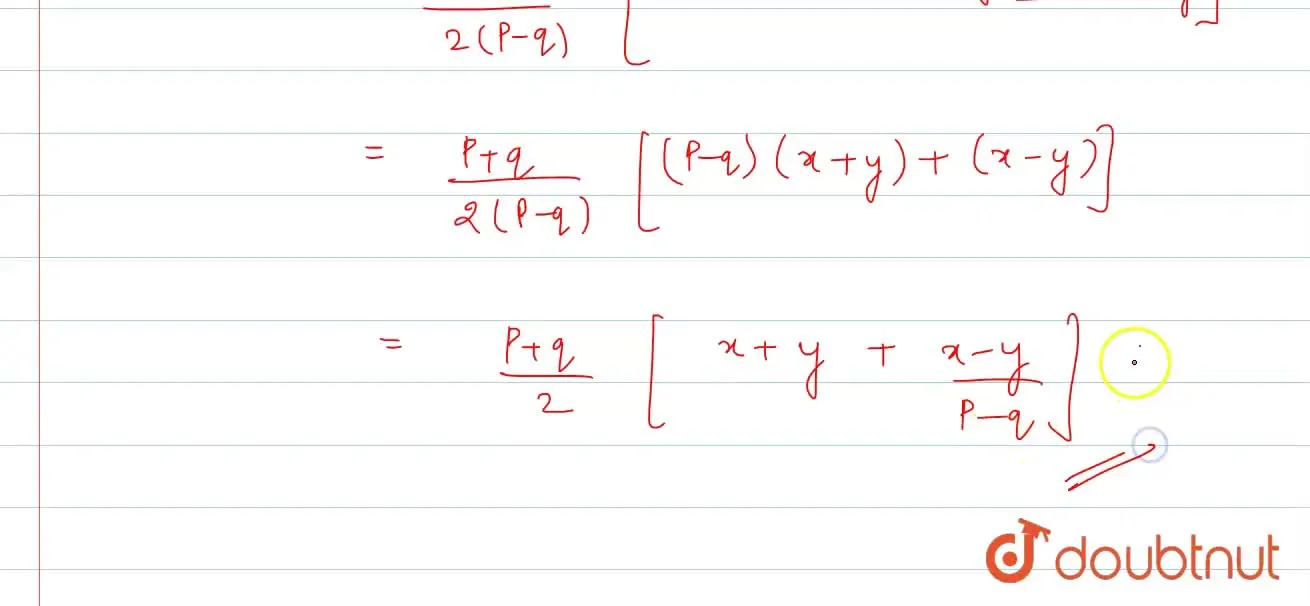The pth and qth terms of an A.P. are x and y respectively. Prove that the sum of (p + q) terms is.
p+q2[x+y+x−yp−q].
N/a
Related Playlists
- BOOK - NAGEEN PRAKASHANCHAPTER - SEQUENCE AND SERIESEXERCISE - Exercise 9D11videos
SEQUENCE AND SERIES
- BOOK - NAGEEN PRAKASHANCHAPTER - SEQUENCE AND SERIESEXERCISE - Exercise 9E12videos
SEQUENCE AND SERIES
- BOOK - NAGEEN PRAKASHANCHAPTER - SEQUENCE AND SERIESEXERCISE - Exercise 9B17videos
SEQUENCE AND SERIES
- BOOK - NAGEEN PRAKASHANCHAPTER - RELATIONS AND FUNCTIONSEXERCISE - MISCELLANEOUS EXERCISE12videos
RELATIONS AND FUNCTIONS
- BOOK - NAGEEN PRAKASHANCHAPTER - SETSEXERCISE - MISC Exercise16videos
SETS
Similar Questions
The pth and qth terms of an A.P. are14and1p respectively. Prove that the sum of (pq) terms will be 12(pq+1) where p≠q.
View Solutionif the pth term of an A.P. is x and qth term is y, show tht the sum of (p+q) terms is p+q2[x+y+(x−yp−q)]
View SolutionIf the pth and qth terms of a GP are qandp, respectively, then (p−q)th terms is :
View SolutionThe pth, qth and rth terms of an A.P. are a, b and c respectively. Show that a(q – r) + b(r-p) + c(p – q) = 0
View SolutionIf the pth, qth and rth terms of a G.P. are a,b and c, respectively. Prove that
aq−rbr−pcp−q=1.View Solution(a) The 3rd and 19th terms of an A.P. are 13 and 77 respectively. Find the A.P.
(b) The 5th and 8th terms of an A.P. are 56 and 95 respectively. Find the 25th term of this A.P.
(c) The pth and qth terms of an A.P. are q and p respectively. Prove that its (p + q)th term will be zero.View SolutionIf (p+q)thand(p−q)th terms of a G.P. re mandn respectively, then write it pth term.
View SolutionThe pth term of an A.P. is aandqth term is b. Prove that the sum of its (p+q) terms is p+q2{a+b+a−bp−q}.
View SolutionIf the pth, qth and rth terms of an A.P. are a,b,c respectively , then the value of a(q−r)+b(r−p)+c(p−q) is :
View SolutionThe pth term of an A.P. is a and qth term is b. Then find the sum of its (p+q) terms.
View Solution


